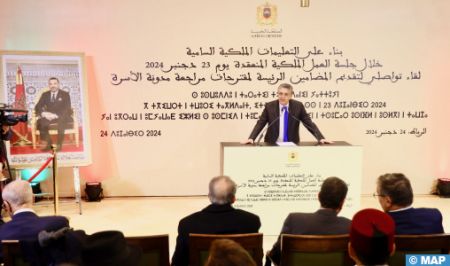King Mohammed VI has instructed a review of the family code in line with Islamic precepts and universal values which introduces amendments protecting the social and economic rights of the Moroccan family.
Following widespread consultations, the committee in charge of elaborating the new code provided the broadlines to the media, in line with royal directives to explain the provisions of the new code to society at large.
Speaking to the press, Justice Minister Abdellatif Ouahbi said the new code meets the contemporary needs of the Moroccan family by protecting the rights of women and children as well as man’s dignity. He said some of the highlights of the review include:
The possibility for Moroccans residing abroad to contract marriage without the presence of two Muslim witnesses if this was not possible.
Setting legal age marriage at 18, exception to this rule at 17 years.
Mandatory consultation of the wife’s opinion during the documentation of the marriage contract whether she allows her husband to marry another wife. The husband should act in accordance to this term.
Establishing a non-judicial body for reconciliation and mediation, whose intervention is required, in principle- except in the case of consensual divorce- with its task limited to attempting to reconcile the spouses and mediating the consequences of divorce.
Making consensual divorce a direct contract between the spouses, without the need for judicial procedures, and reducing the types of divorce, while setting a maximum period of six (6) months to decide on divorce cases.
The wife’s work at home shall be considered as a contribution to the development of assets acquired during the marital relationship.
Considering child custody as a shared right between the spouses during the marital relationship.
The custody of the divorced mother over her children does not lapse despite her remarriage.
Making “legal guardianship” shared between the spouses during the marital relationship and after its dissolution.
Protecting minors and enhancing the legal protection of their assets, and impose judicial oversight on the actions taken by their guardian, trustee, or custodian.
The right of the husband or wife to retain the marital home in the event of the death of the other spouse, according to conditions specified by law.
Implementing the proposal of the Supreme Council of Ulema regarding the issue of “inheritance for daughters,” which allows a person to gift whatever they wish from their assets to female heirs during their lifetime.
Opening the possibility of wills and gifts between spouses in the case of different religions.
Islamic affairs and endowments Minister Ahmed Toufiq said that seventeen issues have been referred for religious consideration, to the opinion of the Higher Ulema Council who gave his approval for most of them.
The Council clarified ways in which some of the other issues could be aligned with Sharia, and indicated that three of them pertain to definitive texts that do not permit ijtihad (independent reasoning). These are related to the use of genetic expertise to establish lineage, the abolition of the rule of ta’sib (agnatic succession), and inheritance between Muslims and non-Muslims.
The new code will be examined by the cabinet before being submitted to the parliament for approval.



